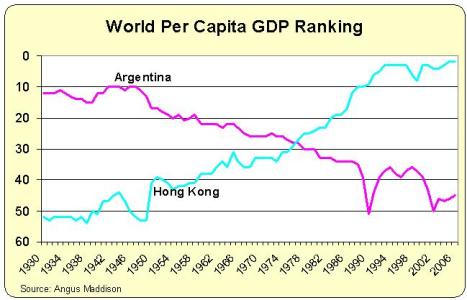Over the last 80 years, the world rankings of Hong Kong and Argentina:
Resource-poor Hong Kong’s relatively laissez-faire free market has taken it from poverty to riches. Resource-rich Argentina’s experiments in statism have taken it from prosperity to decline and semi-functionality. In this Wall Street Journal/Heritage ranking, Hong Kong is currently first in the world for economic freedom and Argentina is 138th.
So I wonder: Why is there not a strong, worldwide move toward free markets? Especially with the excellent results from social science made possible by a generation of hard work and computer power, the data are available and compelling. So why not?
1. Many people are not aware of the data. Economic education has not been a strength of our school system, neither in K-12 nor college.
2. Entrenched interests — bureaucrats protecting and expanding their turf, connected crony capitalists and public-sector unions milking the system, and so on. Once those types are inside the system, it’s hard to get them out.
3. Moral-ideological commitments. When I raise Argentina/Hong Kong-type examples with my academic colleagues, the reaction I often get is a “Maybe” and a shrugging off of the example. The discussion usually turns quickly to moral issues of fairness, equality, corruption, and predation and whether governments or markets fare best by those criteria. My colleagues are typically convinced of the basic morality of government management and the basic immorality of free-market capitalism. So simultaneously they (a) give the statist arguments the benefit of the doubt and hope it will work out better next time, and (b) dismiss the merits of capitalism’s achievements.
 This third point highlights for me the power of philosophy.
This third point highlights for me the power of philosophy.
* In terms of normative ethical content, the principles they accept as morally legitimate are implicitly or explicitly altruist, not egoist: they believe ethics is primarily about helping the weaker by any means, including government compulsion, rather than primarily about self-responsibility and liberty.
* Also in terms of normative ethics, they believe that there is a deep conflict between liberty and what’s best for the weaker. Free markets, they believe, are zero-sum and advantage the predatory strong at the expense of the weaker.
* In meta-ethical terms, those who shrug off the data are anti-consequentialist: they judge by motives, not results. Governments’ motives are altruistic, they believe, and free-market capitalists’ are profit-motive egoistic. So governments get the benefit of the doubt and a cloud of moral suspicion hangs over the free market.
* In epistemological terms, they believe a priori, not a posteriori: their belief commitment is to prior principles rather than to empirical results. The above three ethics elements form in their minds an ideological template. The failures of government do not fit easily into that template; nor do the accomplishments of free markets. So Argentina/Hong Kong-type examples get little traction.
We need: better economic education, better moral education, and a political mechanism to break the hold of entrenched interests.
[Image sources: Daniel Mitchell and Angus Maddison.]

Thanks for this article.
The economic history of Hong Kong is to my mind the most underreported important fact of the 20th century. Underreported for all the reasons you list so well above.
I had a long drawn out argument about Hong Kong with a distributist named “John Medaille in the combox of this blog post http://wdtprs.com/blog/2009/04/the-social-magisterium-and-acton-institute/.
I think it illustrates well the degree to which people will go to deny the lesson that Hong Kong’s story proclaims loud and clear.
I have a legitimate question & I’m not trolling…Hong Kong is often pointed to as the success ground for capitalism, but how can you equally economically compare a country in its industrialization phase with a country in its globalization phase..? (We’re assuming Hong Kong’s growth is sustainable…)
Isn’t that what we are struggling with?